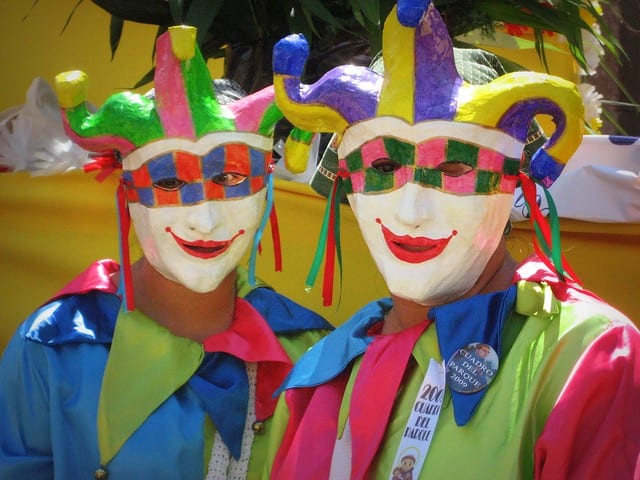
The Wisdom of a Spiritual Fool
Today we celebrate the apparent foolishness of wisdom and the wisdom of a spiritual fool.
It is important, before we each launch our elaborately planned practical jokes, to remember the meaning of fools.
Fools have a long history as privileged people of responsibility. Throughout their history, fools have held protected positions in royal and noble households. They had license not only to amuse but also to criticize people in power. Fools were authorized to give a ruler bad news which no one else could dare deliver.
A fool’s folly can cleverly convey deep truths to powerful people in the guise of humor or distraction.
Queen Elizabeth I apparently rebuked one of her fools for not being sufficiently severe with her. Fools and jesters are central characters in several of Shakespeare’s plays.
We can learn a lot from fools.
The people I admire value the importance of humor and perspective. They appreciate people who help them avoid taking themselves too seriously. Fools can inspire us to recognize the ironies of life. They enjoy laughing, even at themselves. Spiritual fools help ensure we do not miss the deep truths which we can lose in the press of everyday demands.
People whose examples I try to follow surround themselves with people who will tell them the truth. Each of us is constrained by the limitations of our own abilities to see clearly. We each need to give someone the privilege of telling us the truths we may not want to hear.
Each of us needs to trust someone the way a king would trust a fool.
The people who inspire me appreciate the value of an honest voice and a sense of humor.
Are we paying enough attention to recognize the wisdom of a spiritual fool? Will we appreciate it?
Appreciating the Wisdom of a Spiritual Fool
Fools played a significant role in the ancient world. Plato provides an early example of the wisdom of a fool in The Republic through the figure of an escaped prisoner in The Allegory of the Cave.
Many scholars have regarded Socrates as a paramount wise fool of classical antiquity. He was known to make fools of people who thought themselves wise by taking the posture of ignorance.
The wise fool manifested throughout the Middle Ages as a religious figure. The fool for God’s sake was a figure which appeared in both the Christian and Muslim world.
By the twelfth century in France, these figures led to the Feast of Fools, a celebration in which clergy were allowed to behave as fools without inhibition or restraint.
During the Crusades, Christ was recognized as a ‘wise fool’ figure because of his childlike teachings which confounded the powerful and intellectual elites.
The wise fool was popularized, particularly through the writings of Erasmus, Shakespeare, and Cervantes. Images of wise fools are also found in numerous Renaissance artworks, including those of Breughel, Bosch, and Holbein the Younger.
A spiritual fool does not intend to deceive or ridicule people, but to live a simple life which reveals deep truths. They do not take themselves too seriously, but convey wisdom which is not conventional or mainstream. They overstep traditional boundaries to help us overcome our obstacles to seeing life in new ways.
The wisdom of a spiritual fool includes curiosity, creativity, and fun.
Spiritual fools do not try to convince us of their wisdom.
We often discover the wisdom of a spiritual fool which winks at us or has a twinkle in its eye. The humor and irony of spiritual fools tends to draw us in and win us over.
Following the Example of a Spiritual Fool
Many of us would prefer a direct approach to pursuing wisdom. We would like to be able to look something up in a book or online. Our approach to wisdom is like studying a subject in school.
We want to read everything we can find and master wisdom, to learn it and break it down into specific points.
It would be great if we could summarize wisdom on one or two pages.
Wisdom, including spiritual wisdom, does not work that way.
We gain spiritual wisdom by spending time with it. Wisdom is a conversation, a relationship, and not simply a subject for us to master. Wisdom continues to grow and develop as we spend time with it.
It does not respond when we put it under a microscope. We need a surprise at the moment where we think we are beginning to get wisdom under control.
Most of us discover spiritual wisdom after we think we have finished.
We cannot gain spiritual wisdom by studying it like a science. Gaining spiritual wisdom requires an example we can follow. We need a spiritual fool to help us see what is right in front of us.
Celebrating the Wisdom of a Spiritual Fool
Each of us needs to find a spiritual fool whose example we can follow. We look for those who draw our attention to what we usually overlook, what we often forget.
I find many aspects of monastic life which serve as a spiritual fool for me. As I take time to slow down, to pay attention, to breathe deeply, I can see and remember. The questions and insights waiting for me often make me laugh out loud.
Monastic life, and the monastic people who share it, see the world in different ways. They do not try to convince others they are right, but provide an example to follow.
They often confound the people who approach life as an intellectual exercise with the simplicity of their insights.
We celebrate their spiritual wisdom as we step away from our analyzing and overanalyzing and begin to listen.
Each day is a new opportunity to see things afresh.
The spiritual fools I know draw me into taking time to listen and pay attention.
When will we pay attention to the wisdom of a spiritual fool today?
Who is the spiritual fool whose example we will follow this week?
[Image by msdonnalee]
Greg Richardson is a spiritual director in Southern California. He is a recovering assistant district attorney and associate university professor, and is a lay Oblate with New Camaldoli Hermitage near Big Sur, California. Greg’s website is StrategicMonk.com and his email address is [email protected].












